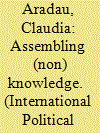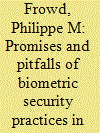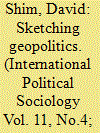|
|
|
Sort Order |
|
|
|
Items / Page
|
|
|
|
|
|
|
| Srl | Item |
| 1 |
ID:
157068


|
|
|
|
|
| Summary/Abstract |
Critical analyses of security have focused on the production of knowledge, techniques, and devices that tame unknowns and render social problems actionable. Drawing on insights from, science and technology studies and the emerging interdisciplinary field of “ignorance studies,” this article proposes to explore the enactment of non-knowledge in security and legal practices. Starting with legal challenges brought against the NSA and other intelligence agencies after the Snowden revelations about mass surveillance, it shows how different modes of non-knowledge are enacted and not just “tamed”: uncertainty, ignorance, secrecy, ambiguity, and error. The enactment of non-knowledge has important implications for how we understand security practices, the relation between security and law, and public challenges to mass surveillance in a digital world. On the one hand, the enactment of non-knowledge by security and legal professionals limits activist and NGO resistance to mass surveillance, when these are focused on claims to knowledge, disclosure, and transparency. On the other, reassembling non-knowledge and knowledge differently has generative political effects and opens new possibilities for intervention and resistance.
|
|
|
|
|
|
|
|
|
|
|
|
|
|
|
|
| 2 |
ID:
157070


|
|
|
|
|
| Summary/Abstract |
Although gardens are typically appreciated as peaceful spaces of apolitical serenity, this article highlights how gardens can provide new sites and sensibilities that complicate our understanding of diplomacy, war, and peace. While gardens are a popular location for diplomatic performances—for example, the Treaty of Versailles—the global politics of gardens remains underresearched in international relations (IR). To address this gap, the article follows the “aesthetic turn” in IR to examine gardens as contingent social constructions of social-ordering and world-ordering, which both shape and participate in global politics. In particular, it develops a framework to examine how peace-war becomes intelligible in gardens through contingent conceptual dynamics such as “civility/martiality.” It then employs the framework to explore how two key national memorial sites—the Nanjing Massacre Memorial in China and the Yasukuni Shrine in Japan—work as gardens to creatively perform civility and martiality in unexpected ways. Such an oblique intervention underlines how war memorials, gardens, and other odd IR sites are not stable containers of meaning but need to be actively (re)interpreted as performances of cultural governance and resistance. Garden-building here is theory-building: by producing new sites and sensibilities of global politics, it creatively shapes our understanding of IR.
|
|
|
|
|
|
|
|
|
|
|
|
|
|
|
|
| 3 |
ID:
157071


|
|
|
|
|
| Summary/Abstract |
Work on affect has made significant contributions to how international relations (IR) scholars understand the high politics of international affairs, capturing political reactions to the horrific, the spectacular, and the exceptional. However, the turn to affect has been less inclined to offer comprehensive insight into the importance of emotion in banal or everyday international politics. The theory of ontological security can offer such insight as it attends to experiences of the everyday, particularly through the discursive production of identity. Identity might be disrupted at moments of spectacular or exceptional events that call it into question but is equally made and remade in the discursive production of everyday life. This research focuses on the latter, analyzing the reproduction of the international in the everyday through the vehicle of British soap operas Coronation Street and Emmerdale, both of which introduced storylines about migrant workers in the late 2000s. British soaps are designed to be culturally proximate and incorporate didactic messages. Analysis of soaps offers a layered and intersectional view of emotional reactions to international migration at the level of an abstracted individual and the level of the nation-as-viewer.
|
|
|
|
|
|
|
|
|
|
|
|
|
|
|
|
| 4 |
ID:
157069


|
|
|
|
|
| Summary/Abstract |
West African states like Senegal are increasingly turning to biometric technologies for border security. In this article I argue that this trend results from the construction and circulation of knowledge about biometrics by a transnational field of security professionals, assembled through official publications as much as through professional practices such as workshops. I argue that this biometric ideal rests on the promise to states in the global south that these technologies enable “smarter” and more efficient borders, enhance prestige, and facilitate states’ integration into global security arrangements. I go on to argue that, although the biometric ideal is often shared by security professionals in the North and South alike, the implementation of biometrics themselves is riddled with failure. These failures are revelatory and stem as much from the technical limitations of biometrics’ border security applications as they do from relations of competition and disaggregation between local security professionals. Drawing on fieldwork in Senegal, I use the country’s entry-exit system and biometric documents to give a view of the everyday practices behind the deployment of security technologies in the country. In doing so, I contribute to research on biometrics in West Africa by adding a focus on these technologies’ security implications.
|
|
|
|
|
|
|
|
|
|
|
|
|
|
|
|
| 5 |
ID:
157073


|
|
|
|
|
| Summary/Abstract |
In the view of some Deleuzian scholars, societal steering evolved from analogue disciplining of static enclosures into network-centric, privatized, digital, and global control. This article re-engages the control thesis from a decidedly empirical security studies perspective. In the age of globalization and urbanization, technological innovation and liberal policy ideals, how are security apparatuses reorganized, and in what relations do they stand to local societal and political orders? The article argues that the Deleuzian framework indeed proposes an impressively rich, integrative, and topical research agenda—but also that its security studies applications can benefit from further development. With a view to vindicating its analytical potential, the article first systematizes the control thesis. It then employs a spatial and empirical heuristic to inquire into the securing of three distinct urban spaces—a site of mobility, a public square, and a place of mass commerce—and to illustrate the actual (re-)configuration of contemporary security management. Forgoing articulation of universalisms about societal steering, the article makes the case for more nuanced engagements with security ensembles, their technological evolution, and their relations with democratic ideals, globalization, and de-territorialization, both in and beyond Western polities.
|
|
|
|
|
|
|
|
|
|
|
|
|
|
|
|
| 6 |
ID:
157072


|
|
|
|
|
| Summary/Abstract |
Recent scholarship in international relations (IR) and international political sociology (IPS) has made significant contributions to the study of images. Chief among such studies on visual politics has been the focus on popular visual media including cartoons, film, photography, and video games. This article takes a look at another prominent medium: the comic. Comics provide ample potential starting points for IR scholars and political sociologists; the comic’s aesthetic qualities—the way in which it narrates geopolitical events to public audiences through condensed image-word relations—reveals a distinct politics of representation. Thus, the study of comics contributes to a better understanding of visuality—theoretically, methodologically, and empirically. This article complements existing work by engaging an example outside of familiar European-language contexts. It discusses a comic booklet that was published by the South Korean Ministry of National Defense in the aftermath of the sinking of the Cheonan, a navy vessel that was allegedly sunk by a North Korean torpedo in 2010. Recognizing comics as narrative sites of (geo)politics, the article explores the booklet’s own way of seeing by discussing its dramatic structure and rhetorical devices. In this way, the article provides an exemplary reading of comics, which can serve as a conceptual basis for future studies in the field.
|
|
|
|
|
|
|
|
|
|
|
|
|
|
|
|
|
|
|
|
|